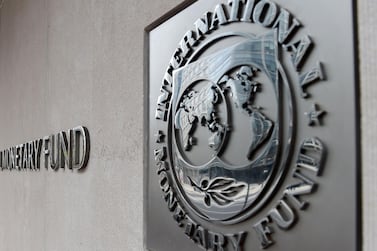The severe shock of the coronavirus pandemic and measures to contain it have pushed the global economy into the deepest recession since the Second World War, with per capita output declining in the largest fraction of economies since 1870, according to the World Bank.
The global economy is expected to contract 5.2 per cent in 2020, a sharp revision from the 2.5 per cent growth projection, the World Bank had made in January. It now expects per capita incomes to decline 3.6 per cent in all regions of the world as a result of the pandemic, which will push more than 60 million people into extreme poverty.
“This is a deeply sobering outlook, with the crisis likely to leave long-lasting scars and pose major global challenges,” the lender's vice president for equitable growth, finance and institutions, Ceyla Pazarbasioglu, said.
"Our first order of business is to address the global health and economic emergency," Ms Pazarbasioglu said in the June 2020 Global Economic Prospects report, released on Monday.
"Beyond that, the global community must unite to find ways to rebuild as robust a recovery as possible to prevent more people from falling into poverty and unemployment.”
The coronavirus outbreak has claimed more than 400,000 lives and infected more than 7 million people worldwide, according to Johns Hopkins University, which is tracking the outbreak.
The pandemic has spread at an astonishing speed to every part of the world and constitutes “the largest economic shock the world economy has witnessed in decades”, Ms Pazarbasioglu said.
Covid-19 is expected to plunge a majority of countries into recession this year, according to the World Bank report.
The World Bank's economic forecast is more pessimistic than the International Monetary Fund, which in April projected global output to shrink 3 per cent in 2020 and recovery to begin only in 2021.
The World Bank expects economic activity in advanced economies to shrink 7 per cent in 2020 as domestic demand and supply along with trade finance sectors take a hit. Emerging Markets and Developing Economies (EMDEs) are projected to shrink 2.5 per cent this year, their first contraction as a group in at least 60 years.
The US, the biggest economy in the world, is forecast to contract 6.1 per cent in 2020, reflecting the disruptions associated with pandemic-control measures. Economic output in the European Union is expected to shrink 9.1 per cent in 2020 as the pandemic hit Germany and France's economies, the bloc's biggest. Japan’s economy is anticipated to shrink 6.1 per cent after Tokyo implemented strict lockdown measures.
Economic activity in the Middle East and North Africa is forecast to contract 4.2 per cent, hit by the pandemic and volatility in oil prices. The World Bank’s forecast for the Mena region is significantly below the 2.4 per cent growth projection it made in January.
Among oil exporting countries, economic activity is expected to contract 5 per cent, as producers implement output cuts agreed by the Opec + alliance of 23 countries to rebalance the oil market. The projection is a sharp revision from January's 2 per cent economic expansion forecast.
Iran’s economy is expected to contract 5.3 per cent, the third year of contraction in a row, as the country continues to struggle amid tighter US economic sanctions. In the GCC, economic activity is projected to shrink an average 4.1 per cent, while Iraq's economy is expected to contract 9.7 per cent.
Oil importers are set to see their economies contract 0.8 per cent in 2020, a downgrade from January’s 4.4 per cent economic expansion forecast.
Under the World Bank’s baseline forecast - which assumes that the pandemic would recede sufficiently for advanced economies by the mid-2020 and a bit later in EMDEs - global growth is forecast to rebound to 4.2 per cent in 2021. The World Bank projects 3.9 per cent growth in advanced economies next year and EMDEs to bounce back 4.6 per cent.
The baseline growth scenario - which also hinges on the global spillovers easing during the second half of this year and relatively shorter dislocations in financial markets – is “highly uncertain”.
Several downside risks cloud the global economy economic outlook, including the possibility of a more protracted pandemic, financial upheaval and retreat from global trade and supply linkages.
“A downside scenario could lead the global economy to shrink by as much as 8 per cent this year, followed by a sluggish recovery in 2021 of just over 1 per cent, with output in EMDEs contracting by almost 5 per cent this year,” the lender said.
The impact of the crisis has been the hardest in countries where the pandemic was severe, especially for those who rely heavily on global trade, tourism, commodity exports and external financing.
“The current episode has already seen by far the fastest and steepest downgrades in global growth forecasts on record. If the past is any guide, there may be further growth downgrades in store, implying that policymakers may need to be ready to employ additional measures to support activity,” World Bank Prospects group director Ayhan Kose said.









